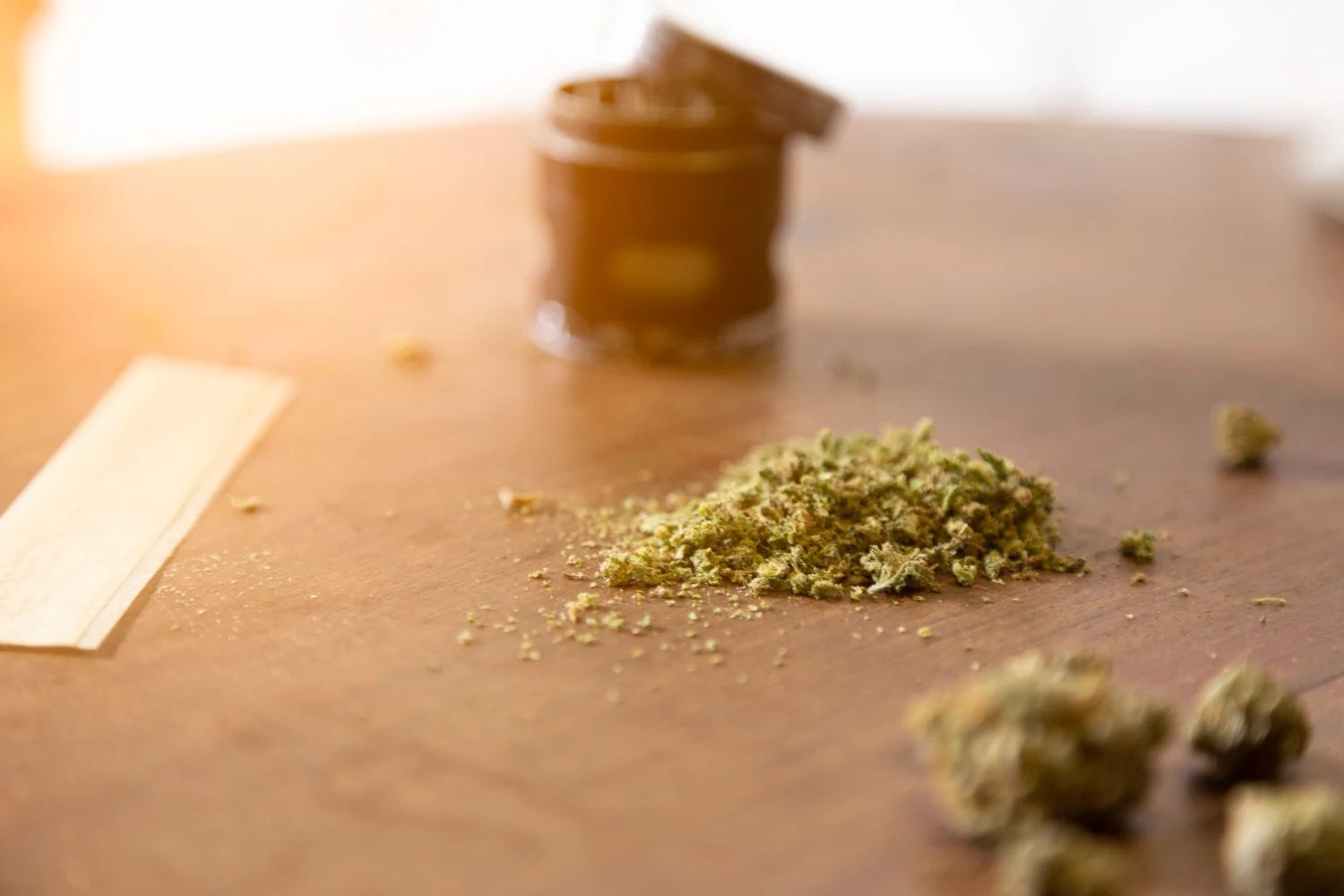Are Edibles Addictive?
Edibles are addictive and lead to cannabis use disorder, particularly with frequent and high-dose consumption. Common signs of edible addiction include cravings and loss of control, increased tolerance, withdrawal symptoms, neglect of responsibilities, persistent use despite harm, significant time spent using or recovering, and reduced engagement in important activities.

The effects of edibles lead to addiction through their powerful impact on the brain. Euphoria and relaxation stem from THC's interaction with neuronal receptors, creating a strong sense of well-being.
This altered perception enhances sensory experiences and emotional states, making activities more enjoyable. Additionally, THC binding to cannabinoid receptors increases appetite, resulting in intense food cravings. These effects create a cycle of dependence, driving users to seek out edibles repeatedly.
If you or your loved one is suffering from edible abuse, Better Addiction Care specializes in connecting individuals struggling with cannabis edibles addiction to effective treatment solutions. Our extensive network includes facilities equipped to address the unique challenges of THC dependence from edibles consumption. Through our free insurance verification and 24/7 confidential helpline, we streamline access to specialized care for edible abuse, helping clients overcome dependency and develop healthier lifestyles free from cannabis edibles.
Are Edibles Addictive?
Yes, edibles are addictive.
Cannabis edibles contain Tetrahydrocannabinol/THC, which has addictive properties. Regular consumption leads to tolerance, requiring higher doses to achieve the same effects.
Some users develop cannabis use disorder, characterized by dependence and withdrawal symptoms. The risk increases with frequent, high-dose consumption and early-age initiation.
The potency of edibles contributes to their addiction potential. The liver converts THC to 11-hydroxy-THC, a more potent compound that creates stronger, longer-lasting effects.
Warning signs of addiction include using edibles to cope with stress, interference with daily responsibilities, failed attempts to quit, and withdrawal symptoms when stopping. Professional treatment helps those struggling with edible addiction.
Edibles, an increasingly common means of consuming cannabis, offer a delicate and handy way to feel the effects of marijuana without the need to smoke. These items, which are often found as baked goods, candies, or beverages infused with cannabis extracts, have grown in popularity in areas where marijuana is legal for medicinal or recreational use. Nonetheless, despite their widespread use and availability, it is critical to understand not only their effects but also the possible negative impact on drug test results.
What Makes Edibles So Powerful?
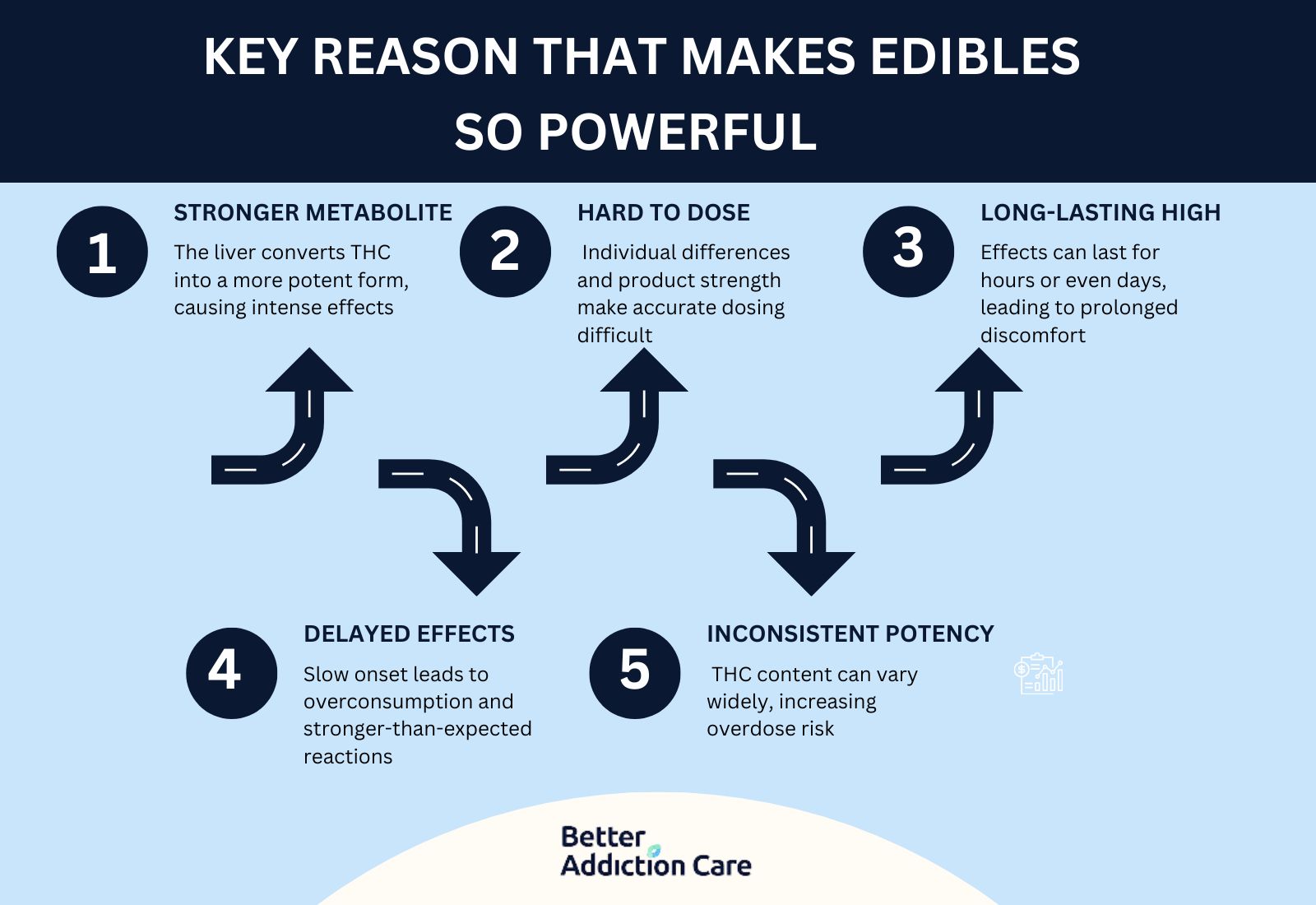
Edibles are so powerful because they undergo a unique metabolic process, create delayed onset effects, and produce longer-lasting experiences. The liver transforms THC into a more potent compound, while the slow absorption through digestion means effects take hours to appear and may persist much longer than other consumption methods.
Here are the key reason that makes edibles so powerful:
-
Metabolism and Potency: After intake, the liver breaks down THC into 11-hydroxy-THC, a significantly stronger metabolite. This increased potency results in intense and long-lasting effects, potentially overwhelming users.
-
Delayed Onset: Edibles exhibit a delayed onset compared to smoking or vaping. This delay leads users to overconsume, as they do not feel the immediate effects. Accidental overconsumption causes uncomfortable and disturbing side effects.
-
Dosing Difficulty: Determining the appropriate dosage for edibles proves challenging due to variations in individual metabolism, tolerance levels, and product strength. This lack of control increases the risk of excessive THC intake, leading to negative side effects such as anxiety, paranoia, and hallucinations.
-
Variable Strength: Edibles, whether homemade or commercially produced, exhibit significant strength variability, even between batches. This inconsistency poses serious risks to users' physical and mental health due to unpredictable effects and potential overdose from uneven THC distribution.
-
Extended Duration of Effects: The effects of edibles last for hours, sometimes days, after consumption, significantly longer than smoked cannabis effects. Users may struggle to manage the intensity of the experience, increasing the likelihood of prolonged discomfort or adverse reactions.
What Are The Signs Of Edible Addiction?
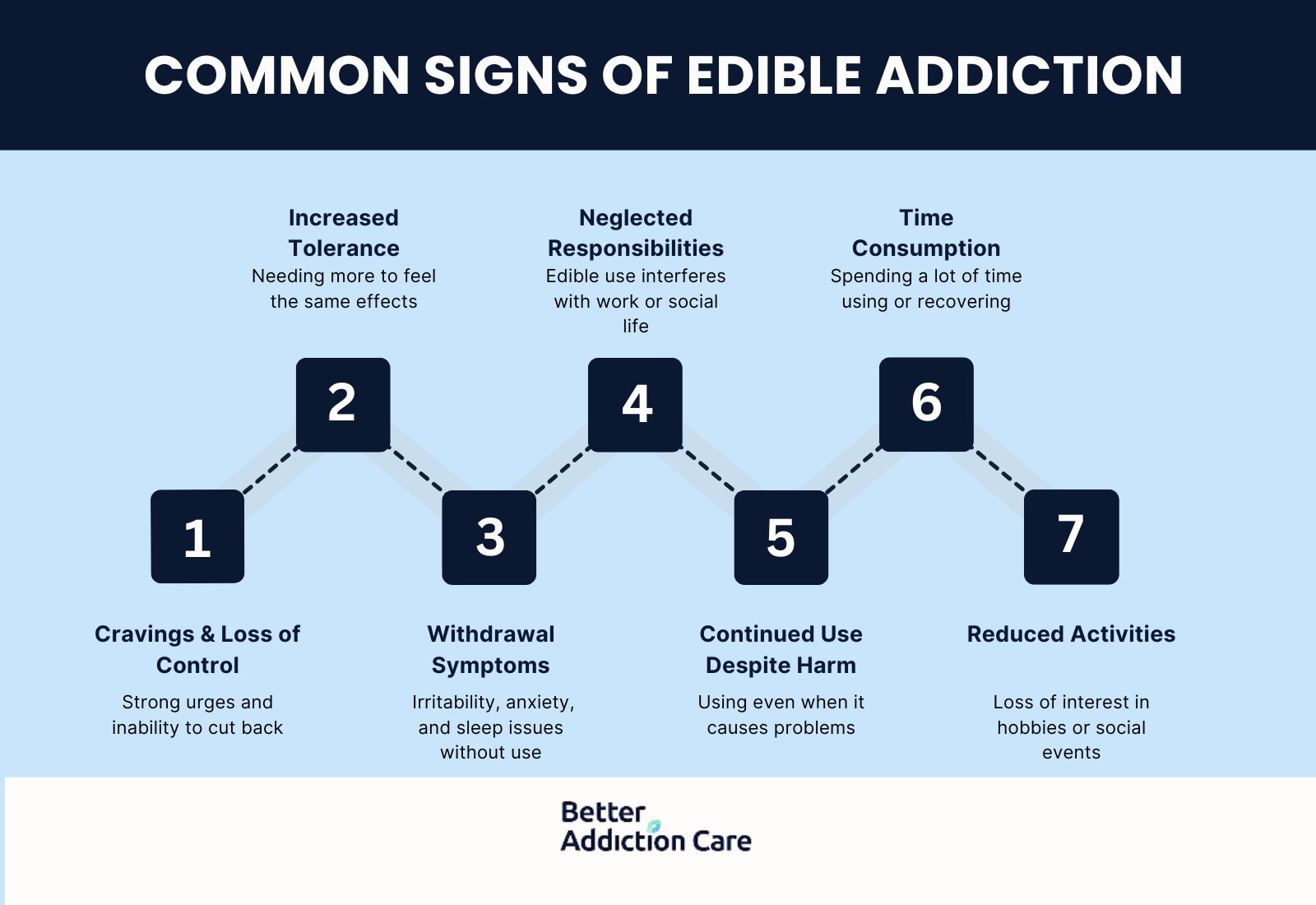
The signs of edible addiction include intense urges with difficulty limiting consumption, requiring increased doses for effects, experiencing irritability when abstaining, continuing use despite negative impacts on daily responsibilities, using despite awareness of harmful consequences, dedicating excessive time to consumption, and abandoning important activities.
The common signs of edible addiction include:
-
Craving and Loss of Control: Strong desire or urge to use edibles and difficulty controlling or reducing use despite attempts.
-
Increased Tolerance: Needing higher doses of edibles over time to achieve the desired effects.
-
Withdrawal Symptoms: Experiencing irritability, anxiety, sleep disturbances, or other physical and psychological symptoms when not using edibles.
-
Neglect of Responsibilities: Continued use despite negative impacts on work, school, or social life.
-
Persistent Use Despite Harm: Using edibles even when aware of physical, psychological, or social problems caused or worsened by use.
-
Time Spent Using or Recovering: Significant time spent obtaining, using, or recovering from the effects of edibles.
-
Reduced Activities: Giving up or reducing important social, occupational, or recreational activities due to edible use.
What Are the Effects of Edibles?
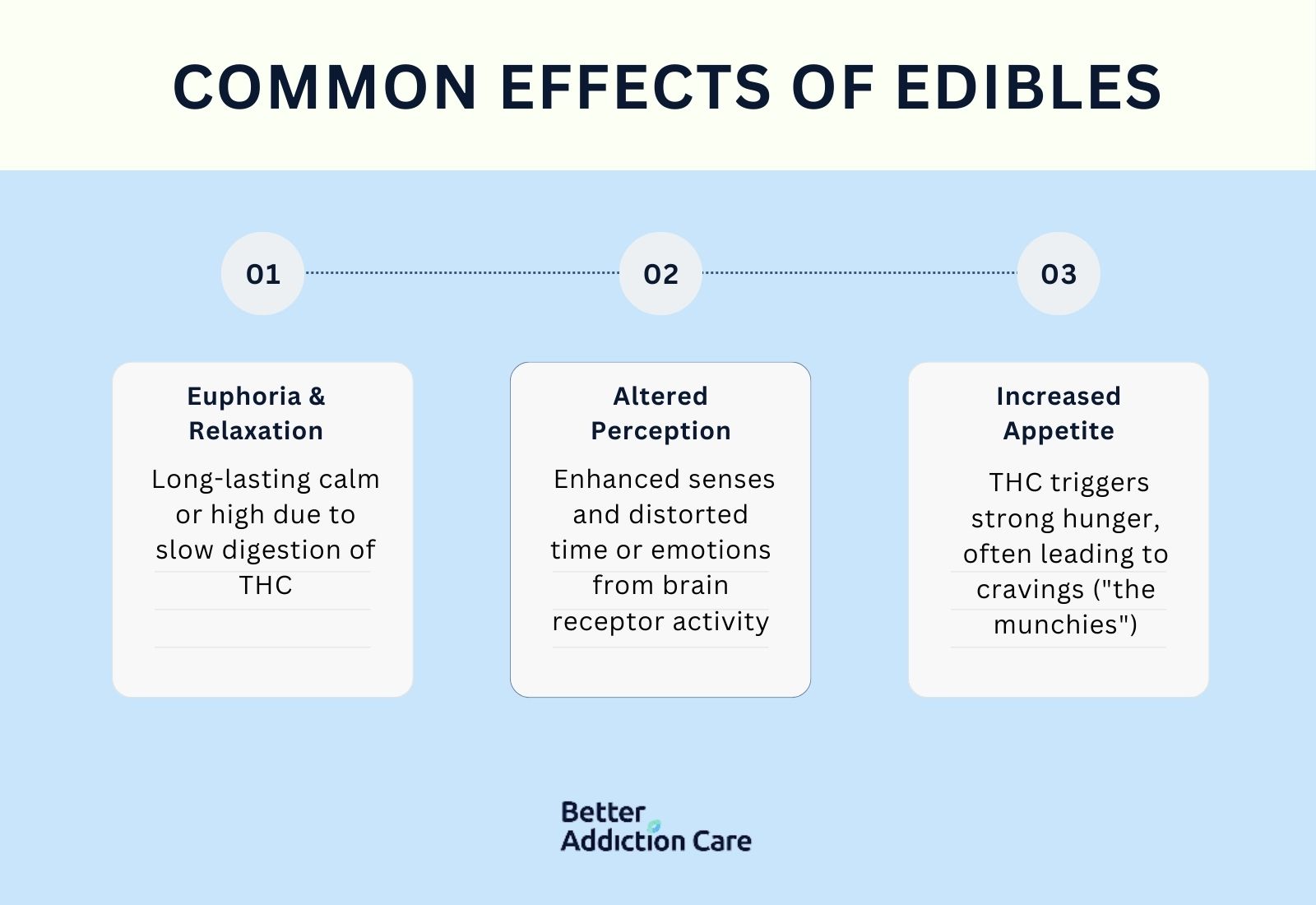
The effects of edibles include euphoria, heightened sensory experiences, and increased appetite, which occur as cannabinoids interact with brain receptors. When consumed, edibles are processed through digestion before entering the bloodstream, resulting in a more gradual onset and longer-lasting experience compared to smoking. Individual responses vary based on metabolism, tolerance, and dosage, with effects ranging from relaxation and altered time perception to enhanced creativity and intensified food cravings.
Here are the common effects of edibles:
-
Euphoria and Relaxation: Edibles produce euphoric and sedative effects as cannabinoids like THC attach to neuronal receptors. This interaction alters neurotransmitter release, impacting feelings, thoughts, and reactions to stress. Cannabinoids in edibles undergo digestion before entering the bloodstream, resulting in gradual effects that last several hours, unlike smoking. Individual experiences vary; some may encounter unpleasant side effects due to factors such as metabolism and dosage.
-
Altered Perception: Edibles induce intoxicating effects through THC's interaction with cannabinoid receptors in the brain. This connection enhances sensory experiences, amplifies sounds and colors, and alters time perception. Users may experience changes in emotional states and mental habits, fostering contemplation and creativity. THC effects vary based on tolerance, dose, and individual sensitivity. The slower metabolism of THC in the digestive tract results in prolonged effects.
-
Increased Appetite: Edibles stimulate appetite as THC binds to cannabinoid receptors in the brain, triggering hunger. This effect, known as "the munchies," increases cravings for savory or sweet foods, complicating food intake control for some individuals. Appetite stimulation levels depend on individual factors such as dosage and metabolism.
What Are The Negative Health Impacts of Edibles?
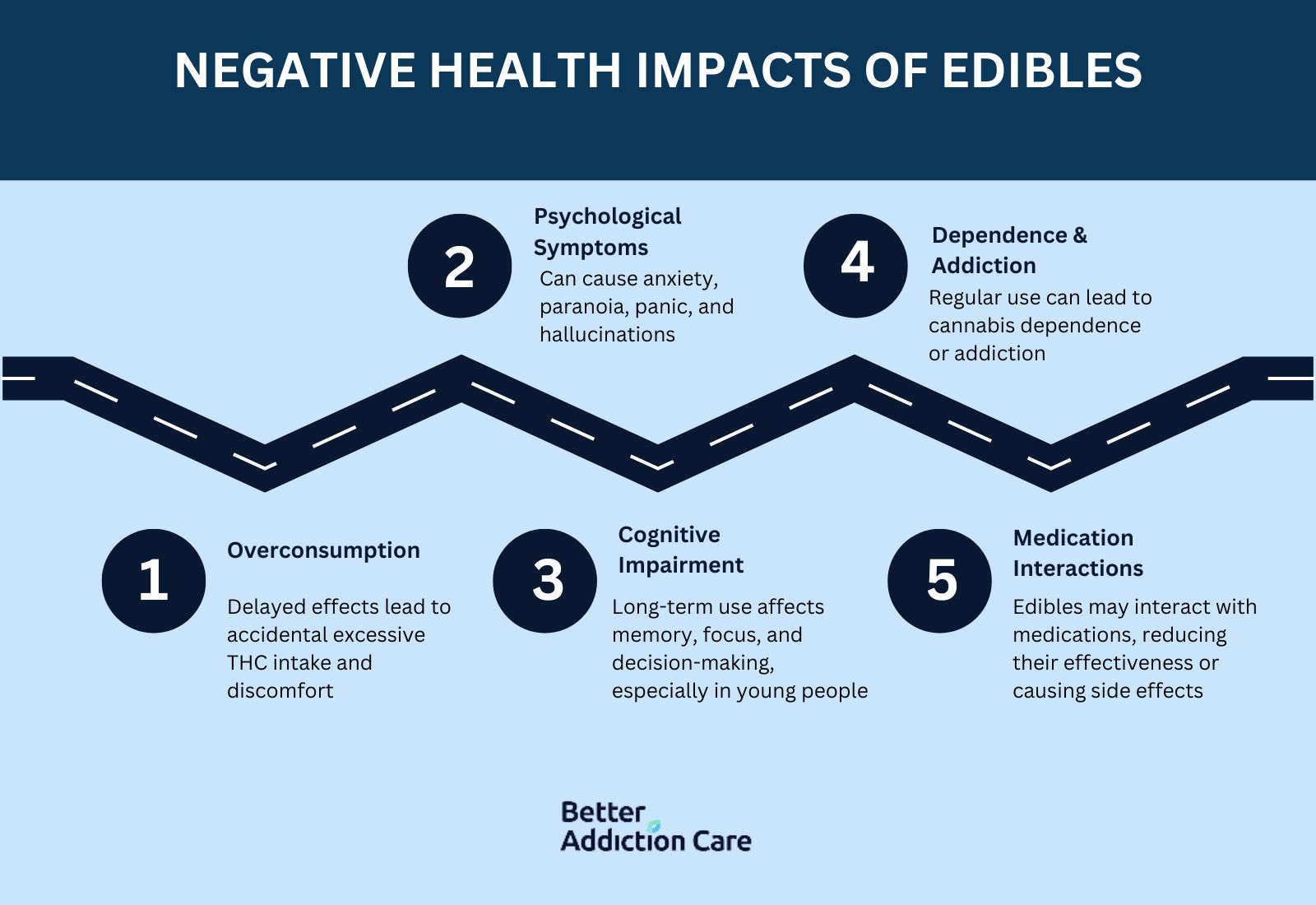
The negative health impacts of edibles include overconsumption risks, severe psychological effects, cognitive impairment, potential for dependence, and dangerous medication interactions.
Here are the negative health impacts of edibles:
-
Overconsumption: Overconsumption represents a major hazard associated with edibles. The delayed onset of effects and the difficulty in precise dosing often lead consumers to mistakenly ingest more THC than intended, resulting in unpleasant reactions and discomfort.
-
Psychological Symptoms: Consumption of THC-rich edibles causes severe psychological symptoms, including anxiety, paranoia, panic attacks, and hallucinations.
-
Impaired Cognitive Function: THC, a psychoactive compound in cannabis, impairs cognitive functions such as memory, concentration, and decision-making. Prolonged or frequent consumption of THC-rich edibles results in chronic cognitive impairment, especially in teenagers and young adults whose brains are still developing.
-
Dependence and Addiction: Consistent and excessive cannabis consumption, including edibles, leads to dependence and addiction.
-
Interactions with Medications: Cannabis interacts with certain pharmaceuticals, including blood thinners, antidepressants, and antipsychotics. Combining edibles with specific medications causes side effects or reduces the medication's effectiveness.
Are Edibles Made Of Cannabinoids?
Yes, edibles are made of cannabinoids extracted from the cannabis plant, primarily THC (tetrahydrocannabinol) and CBD (cannabidiol). THC is the psychoactive component responsible for the "high" associated with marijuana use, while CBD offers potential therapeutic benefits without causing intoxication.
Consuming edibles differs significantly from smoking cannabis. When cannabis is smoked, THC enters the bloodstream quickly through the lungs, producing rapid but shorter-lasting effects. In contrast, when edibles are consumed, the liver metabolizes cannabinoids like THC into a more potent compound called 11-hydroxy-THC. This process results in delayed effects, typically beginning 30 minutes to 2 hours after consumption, but lasting considerably longer, often 6-8 hours or more.
Can Edibles Produce Intoxication?
Yes, edibles produce intoxication. Edibles cause intoxicating effects when consumed.
According to the CDC, edibles take from 30 minutes to 2 hours to feel intoxicating effects and cause intoxicating effects that last longer than expected, depending on various factors, including the amount ingested and whether they are eaten on an empty stomach.
Do Edibles Show Up on Drug Tests?
Edibles show up on drug tests through detectable THC metabolites in blood.
According to Zhao, S.’s 2024 study, ‘The effect of cannabis edibles on driving and blood THC’, participants consumed edibles with an average of 7.3 mg of THC, which produced detectable blood THC levels of approximately 2.8 ng/mL at 2 hours after consumption. Blood analyses revealed significant increases in THC, COOH-THC, and THC-11-OH, as well as CBD in the cannabis condition compared to the control condition at 120 minutes post-consumption. The research found that despite relatively low blood THC levels, participants experienced subjective intoxication for up to 7 hours and reduced willingness to drive for up to 6 hours.
When to Look for Treatment?
You should look for treatment when you regularly use edibles to cope with emotions or stress. Treatment is also necessary if your cannabis use interferes with work, school, or relationships, or if you experience physical or mental health problems related to edible consumption.
Consider seeking help when cannabis use has become a habit you struggle to control, you notice withdrawal symptoms when attempting to stop, previous attempts to quit have been unsuccessful, or friends and family express concern about your cannabis use. Seeking professional help is an essential first step toward overcoming cannabis use disorder and beginning your recovery journey.
How Can Local Drug Rehab Centers Help with Edible Addiction?
Local drug rehab centers treat edible addiction through specialized programs addressing both physical dependency and psychological aspects of cannabis consumption. These facilities deliver comprehensive assessments, detoxification services, and evidence-based therapies designed for marijuana edible dependencies.
Edible addiction creates distinct challenges due to the potent, long-lasting effects of THC in food form. Professional rehabilitation includes cognitive behavioral therapy, motivational enhancement therapy, and group support specifically targeting marijuana use disorders.
Finding the right local drug rehab facility ensures individuals receive personalized treatment plans addressing their specific needs. Better Addiction Care connects patients with centers offering specialized marijuana treatment programs, including education about cannabis effects, coping mechanisms for cravings, and relapse prevention strategies.
Our treatment center network provides both inpatient and outpatient recovery options. Inpatient facilities offer structured environments away from triggers, while outpatient programs allow maintenance of daily responsibilities during treatment. Better Addiction Care's free insurance verification helps individuals find affordable treatment options covered by their health insurance.
Related Articles
Treatment Centers in Virginia
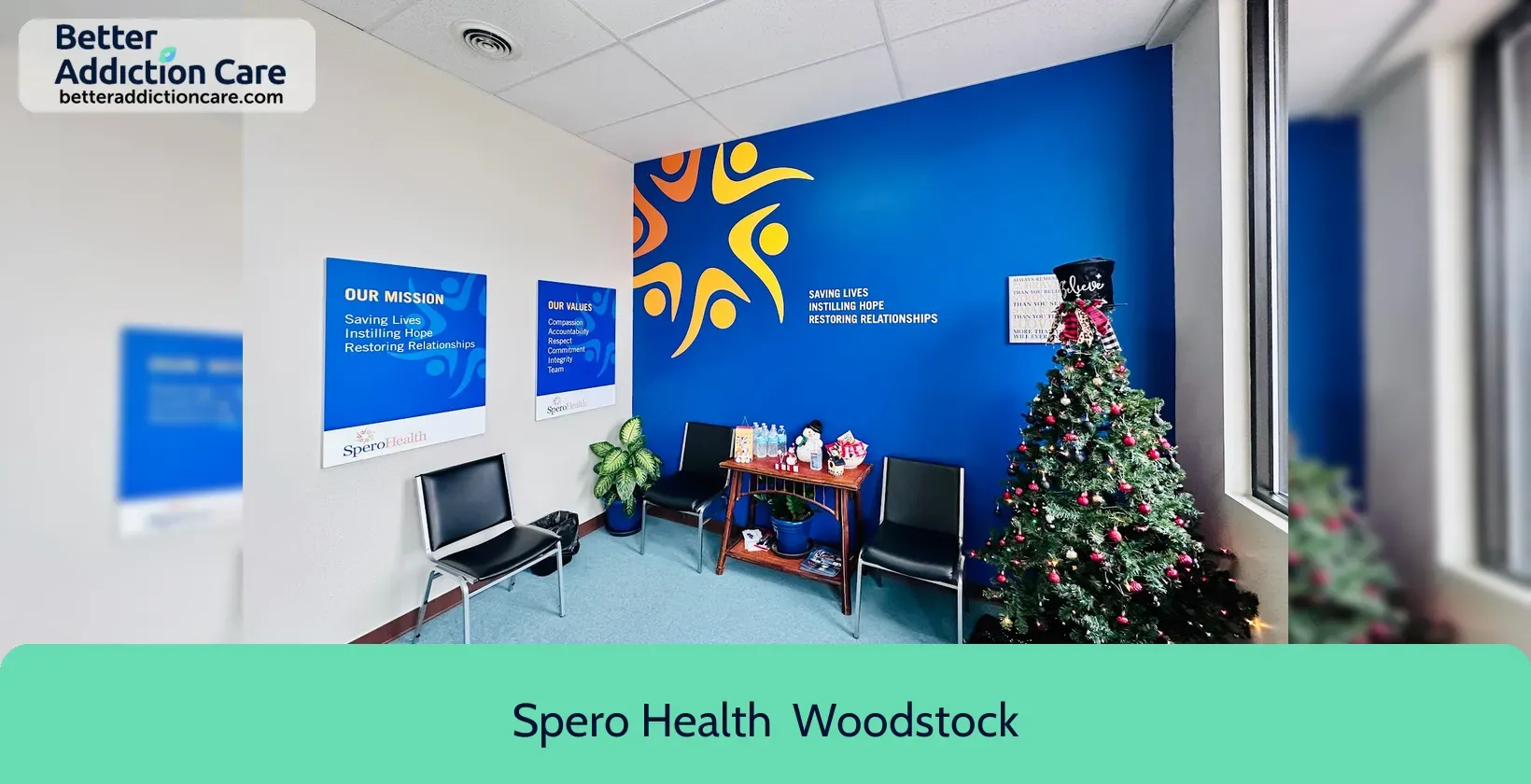 123
123
 123
123
 123
123


